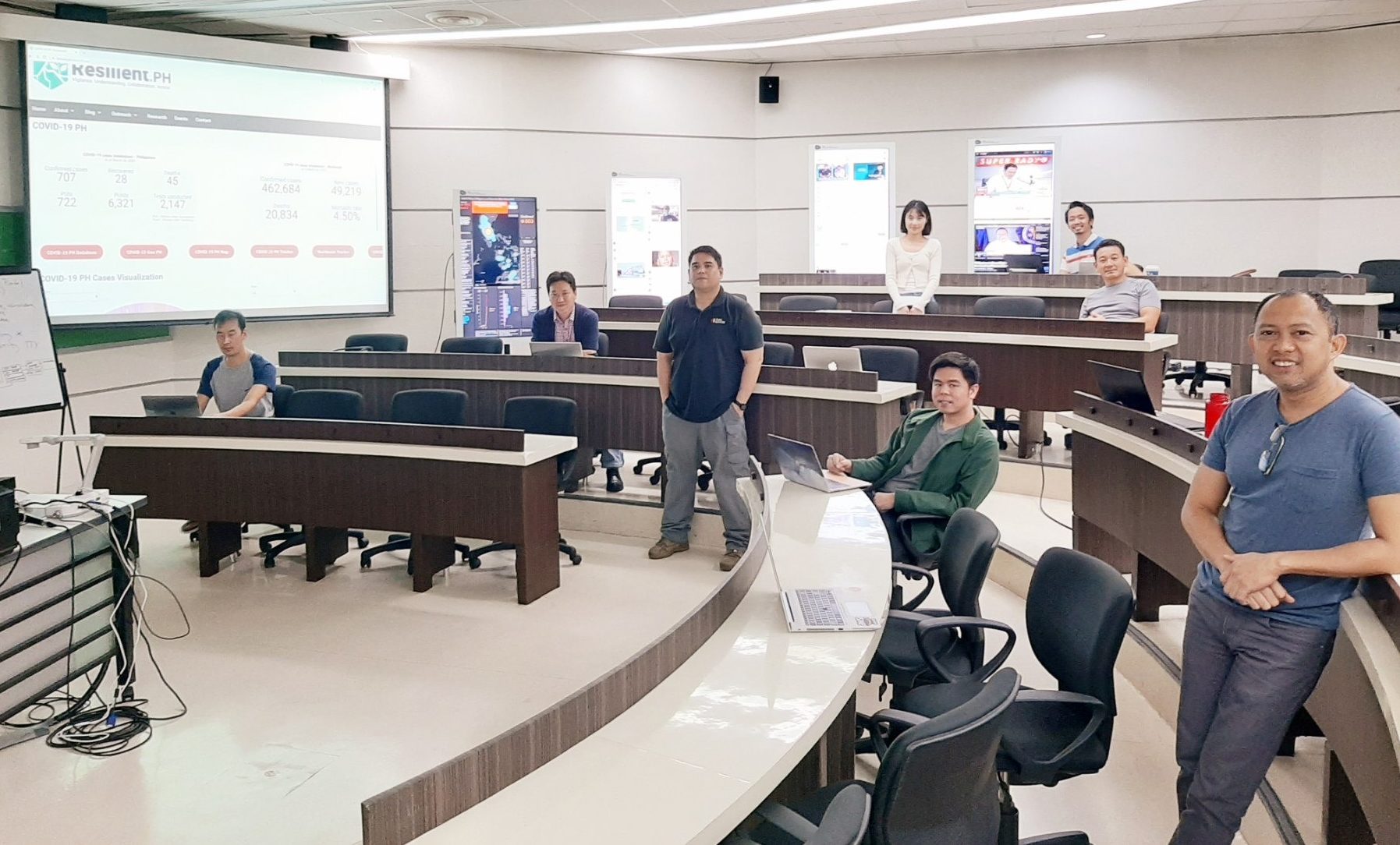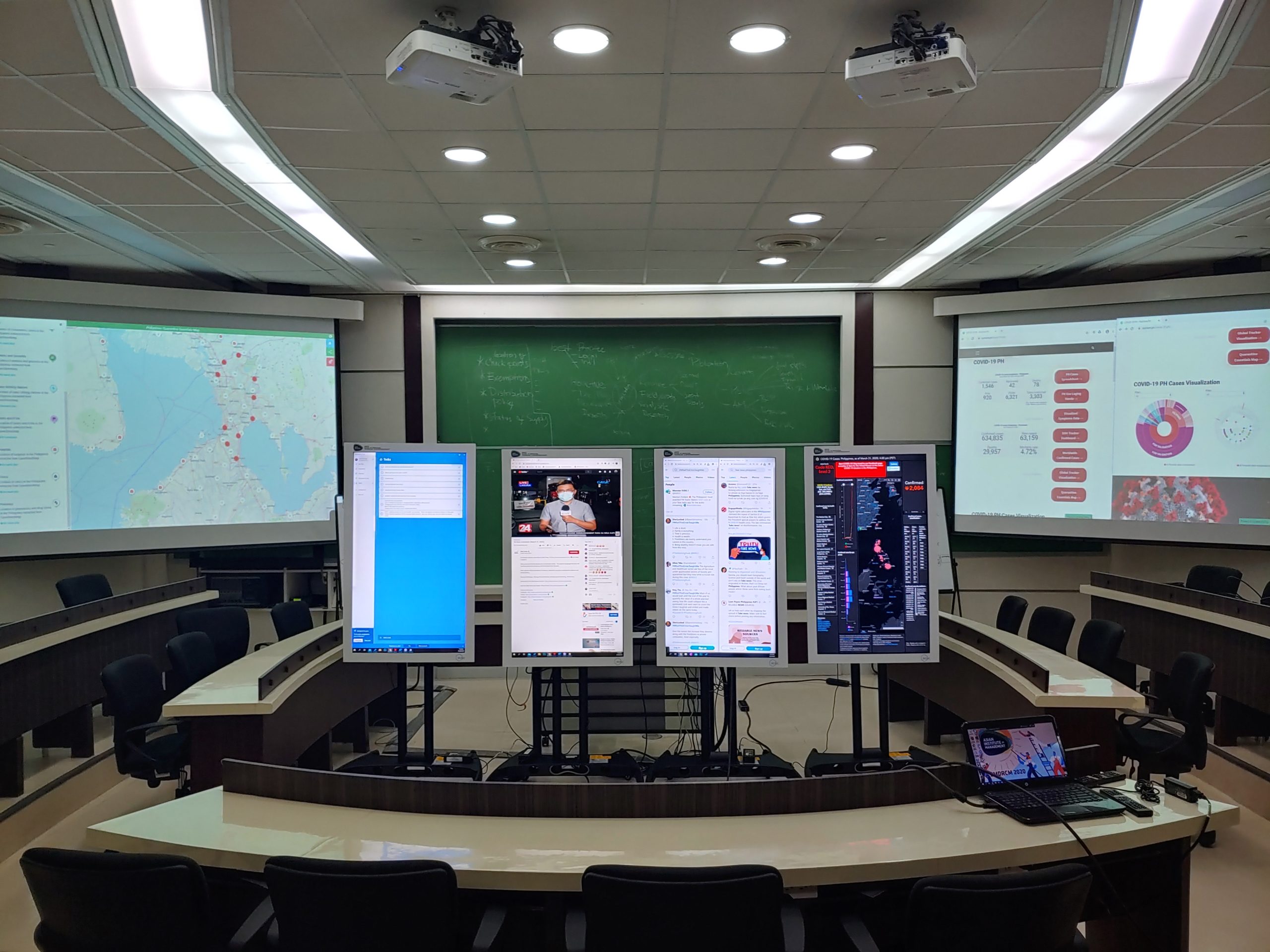AIM students put heads together to battle COVID-19

COVID-19 Situation Room volunteers: (Fromleft) Gyem Tshering, Hoang Dung, Jason Boñaga, Ceci Yang, Jomar Ramirez, Karma Choida, Jeffrey Jalani and Jeffrey Samuel Daquilanea
If you were a professional taking your Master’s, and you got stuck in your university dormitory because of the lockdown, what would you do?
For students of the Asian Institute of Management (AIM) who found themselves in such predicament, the answer was to hole up in another room—and make good use of their free time and skills to come up with useful pandemic-related policy recommendations for public and private sector industries to help weather the crisis.
Composed mainly of Master in Development Management (MDM), Master in Business Administration (MBA), and Executive Master in Disaster Risk and Crisis Management students (EMDRCM), the group has called their volunteer program the COVID-19 Situation Room.
Working from AIM’s Meralco Case Room, and guided by Stephen Zuellig Graduate School of Development Management (ZSDM) head Dr. Kenneth Hartigan-Go, Situation Room serves as “a listening post and communications center, where the students collect and curate news reports and intelligence from a wide range of sources, both primary (contacts and networks) and secondary (online sources).”
Based on their research, the group prepares immediate crisis management recommendations, as well as daily situational reports designed to help craft research papers and policies. EMDRCM student Jason Boñaga, who acts as Situation Room manager along with MDM student Jeffrey Samuel Daquilanea, says they look at two kinds of information: reactive (social media data, on-the-ground info) and proactive (decisions, policies, and guidelines).
Explaining their process, Boñaga says the Situation Room’s information team (led by students Nikki Ebora, MBA, and Tri Thanh Phan, MDM) starts with an “initial triage” of all the reports they’ve collected by sorting and tagging them as “confirmed real,” “confirmed fake,” or “unconfirmed/conflicting.”
The analytics team then assesses all the information. MDM students Jomar Ramirez and Gyem Tshering take care of all the reactive reports, while Jeffrey Jalani and Karma Choida, also MDM students, look at the proactive ones (factual references, such as peer-reviewed publications, signed government documents and official company or private sector memos).
From there, Boñaga says they analyze patterns in and correlations between real-world events and policy, which becomes the basis of their “actionable” recommendations.
For example, one policy brief compiled by the documentation and communication team (led by students Toniphine Flores (MBA) and Carlo Sampan (MDM) 2020, and Paul Julian Tiongson, ZSDM school manager) states how their research revealed “declining safety conditions in treatment and recovery facilities,” which led the Situation Room to focus on three main areas of concern: resource depletion and supply chain pressure points (lack of personal protective equipment, testing kits, medical supplies, food, water—which leads to burnout of medical personnel); congestion and foot traffic (checkpoints and treatment centers pose more risk of coronavirus disease (COVID-19) transmission, as people are forced to wait in long queues); and order and discipline (people not adhering to quarantine guidelines, lying about health condition in consultations).
Based on this assessment, the Situation Room brief recommended three Cs, which are similar to what government has been doing for the past weeks: contain, control and cooperate.
Asked if they’ve reached out to the Inter-Agency Task Force (IATF) for the Management of Emerging Infectious Diseases, Boñaga says, “One of the earlier policy briefs was actually given to the IATF, and we were told that [they] received it. And—just connecting the dots—when we asked our professor if some of our recommendations mirrored our policy briefs, we were told that there’s a high probability that they actually analyzed our data, hence some of the similar wordings in the report that the IATF came out with.”
The Situation Room already works closely with certain local government units (LGUs), adds Boñaga. The student volunteers have been able to provide advice to an LGU seeking to assist stranded families, as well as startups in the food distribution industry, through recommendations on efficient delivery routes.
“We’ve talked about a lot of cooperation—how the public really needs to buy into the lockdown, and how the leadership should have transparency,” Boñaga says. “We’ve talked about social welfare, and reaching sectors that have been overlooked, because government has been so focused on giving relief to everyone. We recommend to do it in a more demographic-oriented fashion to ensure that people who would get it were the ones who stood to benefit the most.”
Agriculture is one sector that also needs the most support, Boñaga adds.
“We’ve talked about how the continuity of the agriculture sector will face some problems because we’ve been concentrating on reactionary measures. A lot of the policies being put into place is all consequence management at the moment,” he says. “We aren’t looking into the resiliency of people—ensuring that farmers, using big data, would be able to surmise on how to send all their products to the right population, and keep all that data, so they would be able to do crop scheduling and ensure that all those crops would be bought 12 months from now.”
The Situation Room is studying all scenarios—what would happen should the lockdown be lifted even with the COVID-19 pandemic still unresolved; how long people can hold out if the lockdown is extended; and what a post-COVID-19 economy would look like. But even beyond this pandemic, Boñaga says they wish to continue the program for the institute.
“We want to replicate this for the next crisis, to create a separate division with the specific task of looking into the business continuity of the school and its constituents—to become a sort of open laboratory for students to come in with select faculty advisers,” he says. “Everyone here is in high spirits, as they are contributing to something that really matters. It’s a story they can tell their grandkids someday.”
For more news about the novel coronavirus click here.
What you need to know about Coronavirus.
For more information on COVID-19, call the DOH Hotline: (02) 86517800 local 1149/1150.
The Inquirer Foundation supports our healthcare frontliners and is still accepting cash donations to be deposited at Banco de Oro (BDO) current account #007960018860 or donate through PayMaya using this link.
